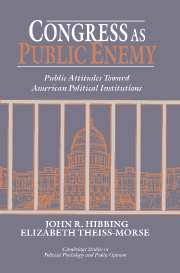Book contents
- Frontmatter
- Contents
- List of figures
- List of tables
- Preface
- CONGRESS AS PUBLIC ENEMY
- 1 Introduction: What is wrong with the American political system?
- 2 Changing levels of support for individual institutions
- 3 Perceptions of political institutions
- 4 Perceptions of congressional features and reforms
- 5 Focus groups and perceptions of the Washington system
- 6 Who approves of Congress?
- 7 Support for democratic processes
- 8 Conclusion: The people and their political system
- Appendix
- References
- Index
1 - Introduction: What is wrong with the American political system?
Published online by Cambridge University Press: 05 August 2012
- Frontmatter
- Contents
- List of figures
- List of tables
- Preface
- CONGRESS AS PUBLIC ENEMY
- 1 Introduction: What is wrong with the American political system?
- 2 Changing levels of support for individual institutions
- 3 Perceptions of political institutions
- 4 Perceptions of congressional features and reforms
- 5 Focus groups and perceptions of the Washington system
- 6 Who approves of Congress?
- 7 Support for democratic processes
- 8 Conclusion: The people and their political system
- Appendix
- References
- Index
Summary
The voices of citizens matter in a democracy, but understanding what these voices are truly saying is difficult. We know that the American public in the 1990s holds the political system, and the institutions composing it, in astonishingly low regard. We also know that people, outside of a temporary honeymoon with the 104th Congress and its new partisan majority, are especially disgusted with Congress. The reason for these negative feelings is much less clear. If we are to understand what citizens are saying, however, we must determine what lies behind their antipathy. We pursue this task in the pages that follow. Our primary thesis is that dissatisfaction with the political system and especially Congress is due in no small part to public perceptions of the processes involved. As will become apparent, some aspects of these allegedly flawed governing processes are of the sort that could be improved through the adoption of certain political reforms, but other aspects are endemic to open democratic government. That the people of the United States, a country often viewed as the initiator of modern democratic government, have an aversion to democratic processes may sound absurd to many, and perhaps obvious to a few, but we ask for patience as we develop the evidence and logic behind this contention and as we append the necessary caveats and qualifications.
- Type
- Chapter
- Information
- Congress as Public EnemyPublic Attitudes toward American Political Institutions, pp. 1 - 21Publisher: Cambridge University PressPrint publication year: 1995

